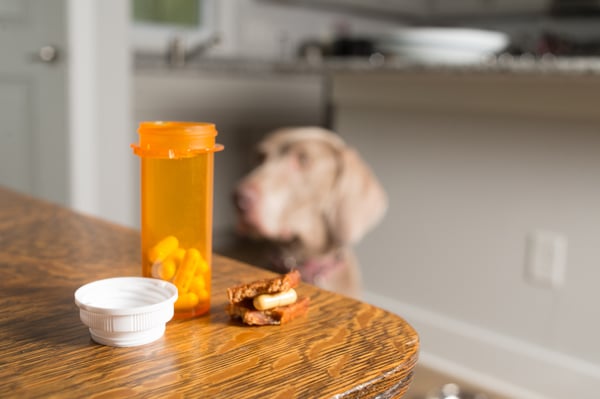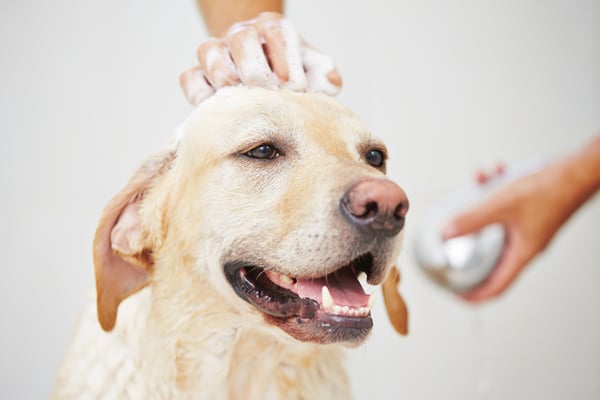
Do you notice your dog scratching a lot more than usual? Or has he developed sores from constant licking and chewing? Learn how to help relieve dogs with itchy skin issues. Why is my dog itching all of a sudden? Why is my dog itching so much?
If your dog is constantly scratching and biting himself, then it's important to find out why and, with the guidance of your vet, provide relief to both the symptoms and the underlying cause.
Dogs suffering from itchy and irritated skin could be reacting to a bug bite, an allergen, or even various skin diseases. This is a common problem that can cause immense distress for a dog, so it shouldn’t be ignored. After all, you do not want to end up saying, My dog is itchy!
In this article, I’ll discuss some of the reasons your dog might have itchy skin, along with some tips for providing dog itch relief.
What Causes Skin Itching in Dogs?
There are many reasons why you might find your dog with itchy skin. Are you wondering why my dog is constantly scratching and biting himself and losing hair? Below are eight common reasons why your dog is itching, but you should also discuss excessive scratching, licking, or chewing with a vet. Especially if you see that your dog scratches its mouth, is losing a lot of hair or has sores.
Dry Dog With Itchy Skin
Dry skin has a variety of potential causes, such as nutritional deficiencies and mild dehydration. Dogs that live in low-humidity environments are also more susceptible.
It’s often obvious if a dog has dry skin, as there will be white flakes, cracked skin, and itching. Your dog will also probably scratch whenever he’s touched.
Allergic Reactions

Food and skin allergies are common causes of dogs with itchy skin. Unlike humans, who sneeze or get a runny nose during a mild allergic reaction, dogs often suffer from itchy skin.
The surprising thing about a food allergy is that it can develop at any time. A dog that’s always been fed the same type of food can suddenly develop an allergic reaction, as it’s repeated exposure that causes the immune response.
Constant skin itching in dogs can also be caused by environmental triggers, such as pollen, dust mites, and mould. Unlike food allergies, these allergies may cause dog scratching only during specific times of the year.
Fleas
Fleas are a common parasite that loves the warmth of a dog’s fur coat and will continuously bite your dog’s skin. Aside from causing itching, this can potentially cause allergic reactions.
Just because you can’t see fleas doesn’t mean they aren’t there. Fleas spend around 90% of their time away from the animal as they lay eggs around the house, so you’ll often only notice them once the infection has become severe.
Mites
Mites are another common parasite that can affect a dog’s skin. Unlike fleas, they are microscopic so can’t be seen by the naked eye. Their effects are often more noticeable, however, as mites cause severe itching, hair loss, sores, and inflamed skin (this is a condition known as mange).
On a related note, ticks may cause a dog to scratch in a specific area. Make sure you remove both the head and body at the same time. Otherwise, it could cause an infection.
Anxiety or Stress
Dogs often scratch when they are stressed. So, if you have a dog with itchy skin, you might want to consider this as a possibility. This is most common during brief moments of frustration, such as when the dog wants to play or is waiting to go for a walk.
For ways to prevent boredom and relieve anxiety through playtime and exercise, take a look at How Much Exercise Does My Dog Need Each Day? for some great tips and ideas.
Severe anxiety can cause continuous skin itching in dogs, though. This is a form of compulsive behaviour that can lead to red patches or inflamed skin. It’s vital that you discuss your dog’s anxiety with a vet, as compulsive dog chewing fur can cause severe damage in a relatively short time.
Hormonal Problems
An imbalance in your dog’s hormone production can make him more susceptible to skin infections. A drop in thyroid hormone, for example, can lead to skin itching in dogs.
Aside from frequent dog scratching, you may notice changes to the texture or colour of your dog's itchy skin. Hormonal problems can usually be diagnosed with a blood test.
Nutritional Deficiencies in a Dog with Itchy Skin
Your dog’s diet can cause chronic itching if it’s lacking in key nutrients. Deficiencies in zinc, copper, and omega-3 fatty acids, for example, can affect skin health.
Nutritional deficiencies are usually caused by poor-quality dog food. While switching to a nutritionally complete and balanced dog diet is the best long-term solution, supplementation can also solve the problem.
Medical conditions that cause malabsorption in the gut can also lead to nutritional deficiencies.
Skin Infections
There are a variety of types of skin infections that can cause your dog's constant itching. A yeast infection, for example, often causes scratching and licking around the toes or ears.
Other examples of skin infections include impetigo, which causes blistering, and folliculitis.
Genetic Disorders
Some dog breeds are more likely to suffer from genetic conditions that can cause scratching. This is often due to generations of inbreeding.
One of the most common examples is the Cavalier King Charles Spaniel. Up to 70% of Cavaliers show signs of a condition called syringomyelia by age six, which affects the spinal cord. It can cause continuous itching due to damage to nerve fibres, ranging from mild skin crawling to more severe burning.
Treatment for Excessive Scratching
Treatment for severe skin itching in dogs depends on what’s causing the problem, which is why you should always contact a vet for advice, diagnosis, and appropriate treatment.
The good news is that most causes of dog scratching face raw can be successfully treated once your dog has received the correct diagnosis. There are also many ways you can provide relief at home. Here are some of the most common treatments and natural remedies for itching.
Prescribed Medication

Several types of medications could help with skin scratching. If your dog suffers from allergies, for example, your vet may prescribe antihistamines or corticosteroids. These can provide quick relief - but don’t solve the underlying problem.
Long-term use of some medications can have an adverse effect on your pet's health. So, talk to your vet about alternative treatments, diet changes, and supplements that may limit the prescription medications required to treat your pet.
For dogs with skin bacterial infections, antibiotics or other medication may be required.
Try a Low Allergy Diet
Switching your dog to a different food brand often isn’t enough to relieve an allergic reaction. Allergies are caused by a specific ingredient in the food, which may be present in another brand.
Instead, you’ll need to switch to a limited ingredient food, preferably using a protein that your dog hasn’t eaten in the past. Raw diets are a great example of a limited-ingredient, low-allergen diet. You can select a diet with minimal processing and few nutrient-dense ingredients.
If your dog’s scratching doesn’t improve on a low-allergy diet, he may be allergic to something in his environment. An allergy test can sometimes help determine what’s causing the problem, but limiting exposure to allergens like smoke, perfumes, and air fresheners may provide some relief.
Check out Food Allergies in Dogs for more information about how to find the right diet to stop itching and make sure your dog gets a complete and balanced diet.
Remove Parasites
If your dog has fleas, start by giving your pet regular flea dirt treatments. This should eliminate existing fleas and stop the itching.
Flea eggs can survive for months, though, so getting rid of an infestation can take time. You’ll need to treat all areas of the home, garage, and car, along with other pets in the house.
Mites are usually treated with an anti-parasitic shampoo. These can be bought from most pet stores, but it’s a good idea to contact your vet to get the right one. Some dogs may also need medication to fight a mite infestation.
Limit Exposure to Airborne Allergens
Relieving allergies caused by airborne triggers can be tricky. Pollen, dust mites, and mould can lead to continuous scratching but are almost impossible to avoid.
There are a few things you can do to limit your dog’s exposure, though. Installing filters in your home, for example, can reduce the number of allergenic particles circulating in the air. Regular vacuuming using a vacuum with a HEPA filter can also provide cleaner air.
Dogs need exercise, so you can’t keep them away from all allergens, but it’s a good idea to stay away from the worst locations. If your dog reacts to mould spores, for example, then avoiding damp woodland areas is important.
Protect Hot Spots
While relieving your dog’s itching is the primary goal, sometimes you need to protect areas during the treatment process. This is particularly important if your dog is starting to develop “hot spots” - patches of skin that are red, painful, and infected.
There are several ways to discourage scratching or biting certain areas. Aside from interrupting your dog whenever he starts to scratch, you can use a special cone collar to make it more difficult to reach with his mouth.
A soothing topical treatment, like Vet's Best Hot Spot Spray, can also be effective at reducing the discomfort of hot spots and aiding in the healing process.
Bathe Your Dog With a Moisturizing Shampoo

Bathing is a great way to remove allergens that are stuck to the skin. Occasional baths can provide relief from airborne triggers and relieve scratching while also getting rid of loose hair and skin.
Products with soothing and moisturizing ingredients like Aloe Vera and coconut oil can be highly effective in treating skin-related issues. Here are a few high-quality dog shampoos and conditioners that are gentle and hydrating:
The problem is that many canine shampoos have a drying effect on the skin. This can lead to flaking and soreness, resulting in more scratching. Instead, use a moisturizing dog shampoo that leaves the skin soft and moist.
Overbathing can cause further dryness; try not to bathe your pet too often. You should also avoid blow-drying your dog with too much heat. Dog blow dryers are designed to use lower temperatures, or stick to towel dry the fur and let him shake the remaining water off naturally.
Wipe Your Dog’s Paws and Belly After a Walk
A quick way to reduce skin irritation from environmental allergens is to wipe your dog’s paws and belly before going inside. Keep a gentle pet wipe on hand, like Earthbath Hypoallergenic Pet Wipes.
This won’t remove all allergens, but it reduces the amount that enters your home. It can also stop your dog from spreading allergens across his skin by scratching.
Alternatively, dog boots and dog raincoats can prevent allergens from coming into contact with the skin. Some dogs don’t enjoy wearing these, however, so you may need to use positive reinforcement training to get your pet to accept clothing.
Supplement Your Dog’s Diet with Omega-3 Fatty Acids
Itching caused by inflammatory conditions can sometimes be helped by supplementing omega-3 fatty acids. Omega-3 has anti-inflammatory properties that can provide significant relief - and may even reduce the need for antihistamines.
The dose required varies depending on a dog’s size, diet, and breed. For this reason, you should discuss omega-3 with your vet before giving it to your dog.
To learn more about Omega-3 supplementation, check out 10 Benefits of Omega-3 Fatty Acids in Your Pet’s Diet.
Summary
Skin itching in dogs can have a variety of causes. Food allergies and dry skin are two of the most common, but environmental allergies, parasites, and genetic conditions can also cause itching.
While most causes of itching aren’t serious and can be successfully treated, it’s important to visit your vet to get the right diagnosis. Treatment varies depending on why your dog is scratching, so it’s best to avoid extreme home remedy treatments until you’re sure of the underlying cause.
Frequently Asked Questions
What are some common external factors that can cause skin itching in dogs?
External factors like fleas, ticks, mites, and contact with irritants such as certain plants or chemicals can lead to skin itching in dogs.
Can food allergies or sensitivities be a cause of skin itching in dogs?
Yes, food allergies or sensitivities to certain ingredients in a dog's diet can manifest as skin itching, resulting in symptoms like redness, rashes, or hot spots.
Are environmental allergies a common cause of skin itching in dogs?
Environmental allergies, including pollen, dust mites, and mould spores, can trigger skin itching in dogs. This condition is often referred to as atopic dermatitis.
Can skin infections lead to itching in dogs?
Yes, bacterial or fungal skin infections can cause intense itching in dogs. These infections often result from scratching or licking irritated skin.
Are there underlying medical conditions that may be responsible for skin itching in dogs?
Yes, underlying medical conditions such as hormonal imbalances, autoimmune diseases, or certain cancers can contribute to chronic skin itching in dogs.
How can I determine the cause of my dog's skin itching?
To identify the cause of your dog's skin itching, consult with a veterinarian. They can perform tests, including skin scrapings, blood work, and allergy testing, to pinpoint the cause of the allergy.
.png?width=200&height=66&name=logo%20(1).png)




